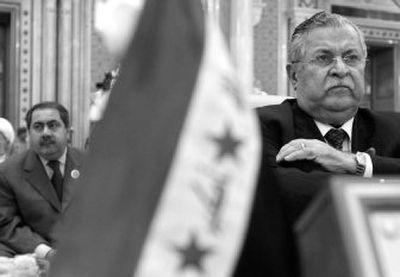Arab League leaders focus on Iran’s growing influence

RIYADH, Saudi Arabia – The specter of Iran loomed over a regional summit that closed here Thursday, with Arab League delegates increasingly anxious over their Persian neighbor’s meddling in Iraq, Lebanon and the Palestinian territories.
Officially, the Arab summit’s only resolution on Iran was the perennial demand that it relinquish three islands claimed by the United Arab Emirates.
In several closed side meetings, however, Arab diplomats focused on larger concerns: Iran’s growing regional power, its potential to inflame sectarian tensions and the unrest their countries could experience if U.S.-led forces were to attack Iran’s nuclear facilities.
“We look forward to decreasing the signs of a dangerous confrontation between Iran and the West that would lead the whole region into the abyss,” Egyptian President Hosni Mubarak said in his closing speech Thursday.
Worry over a strike against Iran took on new urgency this week with the Iranian capture of 15 British troops in disputed waters between Iraq and Iran. The move was condemned by Western powers. Saudi Foreign Minister Prince Saud al Faisal on Thursday called it a “very unfortunate incident” and asked for the troops’ release.
“We don’t need any more inflammatory incidents in the Gulf,” al Faisal told reporters in Riyadh.
The latest incident adds to a long list of Arab concerns that includes Iran’s defiant pursuit of a nuclear program and its support for the Palestinian Sunni Muslim militant group Hamas and the Lebanese Shiite guerrillas of Hezbollah.
Delegates also called Iran a driving force for the sectarian tensions in Iraq and worried about the potential for similar turmoil in Gulf Arab nations and areas with significant Shiite populations, such as Kuwait, Bahrain and Saudi Arabia’s Eastern Province.
Egypt and Syria held a closed bilateral session Thursday where, officials said, envoys worked stealthily to wean Damascus from Tehran’s sway. Egypt and Saudi Arabia also proposed a new pact to guard “Arab national security” that would include a comprehensive review of nuclear issues in the region – a swipe at both Iran and Israel.
Sunni-Shiite tensions in the region are more strained than at any time in a generation, largely the residual effect of the U.S.-led war that overthrew Saddam Hussein’s Sunni Arab regime and ushered in an era of unprecedented power for Iraq’s Shiite majority and Kurdish allies.
Iraqi Foreign Minister Hoshyar Zebari, a Kurd, bluntly told his Arab counterparts at the summit that they must stop acting as “spectators” to the war and counter the Iranian presence in Iraq by strengthening diplomatic ties and taking action to stop the flow of weapons and fighters to the Sunni insurgency.
Iranian Foreign Minister Manouchehr Mottaki, attending the Riyadh summit as a guest, kept a low profile and held side talks with Arab nations such as Oman and Syria.